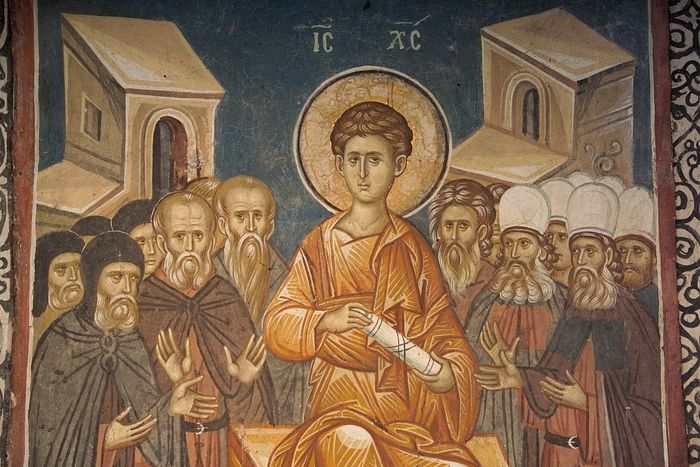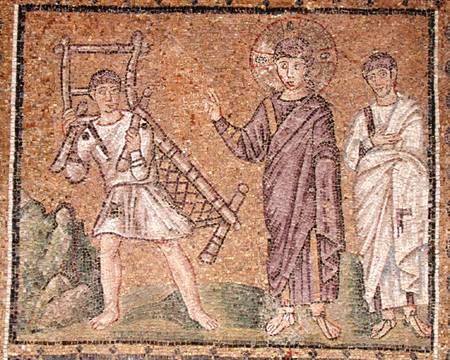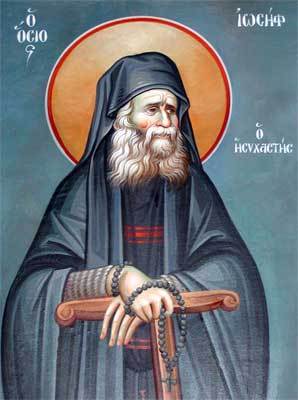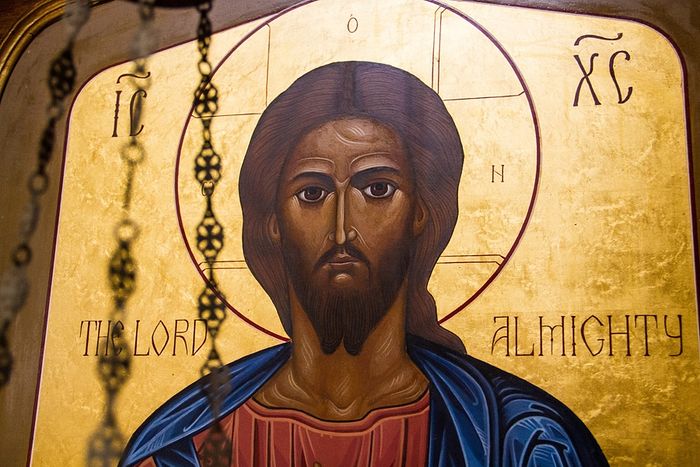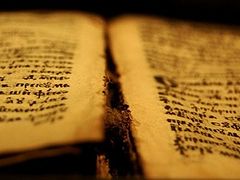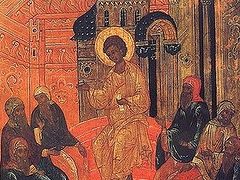Summary
John 7:1-35 concerns Christ’s going up to Jerusalem for the Feast of the Tabernacles. First we are told that because of His dialogue in chapter 6 concerning the eating of His flesh He will no longer walk in “Jewry” because the Jews sought to kill Him. In vv. 3-9 Jesus converses with his brethren who urged Him to go with them to Jerusalem for the feast and to make Himself known publicly, but He declares that His time is not yet come, and He remains behind as they go to Jerusalem, and departs later on His own. Verses 11-13 show that there was much disagreement concerning Christ and that the people earnestly sought Him out at the feast. In vv. 14-35 Christ teaches in the Temple, declaring that His doctrine is not His but that of the Father Who sent Him. He challenges the people: since they also do not wholly keep the Law, why do they seek to kill Him, believing that He broke the Law in healing the paralytic on the Sabbath? The people debate about whether or not He is the Christ and He declares to them that He has come from the Father, Whom the people do not know. Many believe on Him, but the Pharisees and the chief priests seek to capture Him. Although His hour is not yet come, there is coming a time when He will depart to a place they do not know and cannot follow Him to. Not understanding that He will return to the right hand of the Father, the Jews question if He is announcing His intention to teach throughout the diaspora.
Background
Regarding the Feast of Tabernacles, Raymond Brown writes that the fall harvest fest received the name of Sukkot (literally “huts,” but also translated as “booths, tents, tabernacles”) because it was celebrated outside in the vineyards where the Hebrews made huts of tree branches. It was also theologically associated with the wanderings of the Israelites in the desert when they dwelt in tents. Lev. 23:39 says that the feast should begin on the fifteenth of Tishri (Sept-Oct). Deut. 16:13 mentions a seven-day feast, but Leviticus also speaks of an additional eighth day of solemn rest.[1] Along with Passover and Pentecost, it is one of the three feasts on which Jews were mandated to make a pilgrimage to the Temple in Jerusalem. Moses instructed the children of Israel to gather for a reading of the Law during Sukkot every seventh year (Deut. 31:10-11), King Solomon dedicated the Temple in Jerusalem on Sukkot (1 Kings 8; 2 Chron. 7), and Sukkot was the first sacred occasion observed after the resumption of sacrifices in Jerusalem following the Babylonian captivity (Ezra 3:2-4). According to Zechariah 14:16-19, the messianic era Sukkot will be a festival for all nations in which all people will make a pilgrimage to Jerusalem.[2]
Liturgical Usage
Liturgically, this passage is read from twice in the fourth week of Pascha. John 7:1-13 is read on Tuesday of the fourth week of Pascha, which is the day prior to Mid-Pentecost, and John 7:14-30 is read on Wednesday of the fourth week of Pascha, which is the feast of Mid-Pentecost. It is coupled with Acts 14:6-18 in which St. Paul heals a man crippled from his mother’s womb, which causes the people of Lystra to worship him and Barnabas as gods. Earlier, Christ had healed the paralytic at the Sheep’s Pool, which is read on the Sunday prior, which was a powerful sign of His true divinity, and to which He makes reference in this passage, in v. 23, saying: If a man on the sabbath day receive circumcision, that the law of Moses should not be broken; are ye angry at me, because I have made a man every whit whole on the sabbath day? Jesus also speaks of His divinity in this passage, saying that He has come from the Father Whose doctrine He preaches, and Whom the people know not. That this passage is used in preparation for and in celebration of Mid-Pentecost shows us what the Church sees in this passage for our spiritual benefit. The Troparion, which hints at Christ’s encounter with the samaritan woman which is read on the following Sunday, reads: “In the middle of the Feast, O Savior, fill my thirsting soul with the waters of godliness, as Thou didst cry to all: 'If anyone thirst, let him come to Me and drink' (John 7:37). O Christ God, Fountain of our life, glory be to Thee!”
The Church presents before us once again the theme of water which is heavily emphasized in the period of the Pentecostarion. “The Fathers teach us that this feast stands in the middle of the fifty-day period from Pascha to Pentecost as a mighty flowing river of divine grace which has these two great feasts as its source.”[3] Interestingly, the verse that is quoted in the Troparion, John 7:37, is not actually read until Pentecost itself. In fact, the readings for this feast actually say nothing at all about water, but rather seem to emphasize Christ as teacher, as He was teaching in the Temple during this feast of Tabernacles. This is why the icon of the feast shows the 12-year old Christ in the Temple, which is His first manifestation as “teacher.” This theme of Christ as Teacher and Wisdom is more central to the Gospel chronology, as He reveals Himself between the stories of the paralytic and that of the blind man. St. John writes:
Now about the middle of the feast [because He is teaching in the middle of the feast this is an appropriate reading for mid-Pentecost, which is exactly mid-way between Pascha and Pentecost] Jesus went up into the temple, and taught ... Jesus answered them, and said, 'My doctrine is not mine, but his that sent me. If any man will do his will, he shall know of the doctrine, whether it be of God, or whether I speak of myself' (John 7:14-30).
The hymns for the feast refer time and again to Christ as Divine Wisdom: “Thou, the Wisdom of God, didst come to the temple at Mid-Feast (Aposticha of Vespers); “For they knew not that Thou art the Wisdom that fashioned the world … (Glory of the Aposticha at Vespers); “Thou, O Savior, dost pour out for all the world living waters of wisdom and endless life … (Glory of the Sessional Hymn at Matins), and many others.[4] In this hymn we see the connection between Wisdom which we see in the readings, and water which we hear of in the Troparion. Christ is the hypostatic Wisdom of God Who grants us the waters of eternal life, and His words are wisdom which guide us to Him. Some argue that Agia Sophia (Holy Wisdom) celebrated its names’ day on Mid-Pentecost because of this theme in the feast.
The waters of godliness
Christ reveals Himself as Teacher and Wisdom and also emphasizes His divine nature in saying that He came from the Father. This is appropriate following the celebration of Pascha in that only God Who is Life could conquer death, and in preparation for Pentecost when the Holy Spirit is sent, revealing Christ as our source of life and grace. Fr. Seraphim Rose writes of this feast that, in the midst of feasting on earthly delights in celebration of Pascha, it teaches us to thirst for what is above—for the grace and divine wisdom of Christ.[5] Mid-Pentecost was especially loved by the holy elder Joseph the Hesychast who indeed thirsted for what it is above and would especially prepare for it in order to receive the “waters of godliness” that we sing of in the Troparion.”Many were the ascents in his heart and great the divine vision which he received on this feast as a soul truly thirsty.”[6]
It is only if we thirst for the grace and wisdom of Christ that we can become as one like Elder Joseph, and certainly like Christ Himself. This is an important lesson we can learn from this passage. The Jewish people and leaders did an awful lot of talking and arguing about Christ, but there seems to be little desire to know what He was actually about—there seems to be little thirst for truth. His brothers mock Him and accuse Him of cowardice and vainglory, the people in Jerusalem murmur about Him and seek to kill Him, and even those who think He is a good man ultimately prove to be cowards and do not speak up in His defense. Nowhere in this passage do we see anyone inquire honestly about His origin or His mission, but rather they dispute amongst themselves. They delight in taking part in the feast but seem to miss what the feast is really about.
This is a huge problem for modern man as well. How many people anymore care about truth? How many anymore really thirst for God, even within the Church? This is why it is imperative for us to dedicate our lives to Truth and seeking for God—that we might be a light to others who are floundering and floating aimlessly about in life. We have to be careful not to get trapped by the externals of the faith. It is an easy temptation for us to celebrate the feast but miss what its really about, just as did the Jews in this passage. Fr. Seraphim offers us some wise words in this regard. He calls for us to have an innocent Christian attitude, not one that is obsessed with worldly-wisdom and sophistication, which kills the soul. As an example he speaks of the temptation to go off to monasteries and cathedrals and Orthodox events that make us feel important and make us feel that Orthodoxy is important, but to remain only on the external level and not gain any real spiritual benefit from such places and events. We should go to Athos, or the Holy Land, or Romania, etc to learn something about the spiritual life—not just to be able to say we went there.[7]
Raymond Brown makes an interesting comment on the Jews who seem to only be concerned with signs and wonders and external things that ultimately don’t lead them to real living faith. He sees a connection between the three requests made of Christ in John 6 and 7 and the temptations of Christ in Mt. 4 and Lk. 4. In John 6:15 the people would make Him king, and Satan offers Him the kingdoms of this world. In John 6:31 the people ask for miraculous bread, and Satan tempts Him to turn stones into bread. In John 7:3 His brothers urge Him to go to Jerusalem to show His power (although they are mocking Him), and Satan takes Christ to the Temple to display His power by jumping from the pinnacle. So to focus merely on the externals and signs and wonders that make us “ooh” and “aah” in fact makes us quite like Satan.[8]
The one thing needful
The cure for this is to return to the one thing needful—to thirst for God. To thirst for God is to seek for a wisdom above human wisdom. The wisdom and logic of God is Uncreated and does not know the limits and boundaries of our human, created wisdom and logic. Christ alludes to this in vv. 23-24 when He says: If a man on the sabbath day receive circumcision, that the law of Moses should not be broken; are ye angry at me, because I have made a man every whit whole on the sabbath day? Judge not according to the appearance, but judge righteous judgment. (Alan Richardson points out in his commentary on the Gospel of John that Christ may here be alluding to Deut. 1:16-17 which reads: And I charged your judges at that time, saying, Hear the causes between your brethren, and judge righteously between every man and his brother, and the stranger that is with him. Ye shall not respect persons in judgment; but ye shall hear the small as well as the great; ye shall not be afraid of the face of man; for the judgment is God's: and the cause that is too hard for you, bring it unto me, and I will hear it.[9])
Human wisdom may judge according to appearance, and tries to fit our experiences and knowledge into a system whereby we can judge—such as the Mosaic Law here—but Christ calls us to free ourselves from our systems and judge by a divine standard—the standard of righteousness. Rigid adherence to the Law would have kept the paralytic in his infirmity, but Christ operates by a higher Law wherein healing takes precedence. This was already hinted at in the Old Testament, as Christ points out, in that circumcision took precedence over the keeping of the Sabbath. It was more important to properly bring a child into the covenant with God than to keep one part of that covenant. And so in the Christian life there are no 100% absolutes, but in every situation we must do what is best for theosis, to the best of our discernment. We must thirst for the true wisdom of God and play our part in our salvation.
Commenting on this peculiarity of Orthodox theology, St. John Chrysostom writes:
Seest thou that the Law is most established when a man breaketh it? Seest thou that the breaking of the Sabbath is the keeping of the Law? that if the Sabbath were not broken, the Law must needs have been broken? so that I also have established the Law.” He said not, “Ye are wroth with Me because I have wrought a thing which is greater than circumcision,” but having merely mentioned what had been done, He left it to them to judge, whether entire health was not a more necessary thing than circumcision. “The Law,” He saith, “is broken, that a man may receive a sign which contributeth nothing to health; are ye vexed and indignant at its being broken, that one might be freed from so grievous a disease?[10]
St. Augustine writes similarly, placing the emphasis on what is good for salvation:
If the eighth day from the child’s birth fall on the seventh day of the week, what will ye do? Will ye abstain from work to keep the Sabbath, or will ye circumcise to fulfill the sacrament of the eighth day? But I know, saith He, what ye do. “Ye circumcise a man.” Why? Because circumcision relates to what is a kind of seal of salvation, and men ought not to abstain from the work of salvation on the Sabbath-day. Therefore be ye not “angry with me, because I have made a man every whit whole on the Sabbath-day.[11]
As Craig Keener points out in his commentary on John, Christ is not saying anything here the Jews of His time would not be familiar with. He is using a qal vahomer (light to heavy) argument which was long standing practice in ancient Mediterranean reasoning and appears in sages contemporary to St. John. The argument is that if the Sabbath can be superseded for excising a single member, then how much more for restoring the whole person which affects all of one’s members—one’s entire life? He also notes that protecting life taking precedence over the Sabbath was already a long-standing Jewish tradition.[12]
The Person of Christ
This reality is also revealed to us in the Person of Christ. The Divine Logos condescended to take on our human nature and raise it up to His level. St. Athanasius gives us the famous quote: “God became man that man might become God.” Of course, we know that man will never become like God in his nature, but we can be filled with the divine energies that impart to us the very life of God. So Christ stooped down to us and partook of our life where we obsess over externals, and murmur, and turn form truth, and rely on systems, but He did not partake in any of this, and He transfigured our nature, calling us to something higher—to the life of the Uncreated. This section of John 7 has a lot of emphasis on this issue of Who Christ is—which really tells us who we are as well and what we are called to.
Following St. John Chrysostom, Blessed Theophylact writes that Jesus no longer walked in Jewry when they sought to kill Him so as to confirm the reality of His human nature. Although He did not fear death and could have easily walked among them without being harmed (for He only died when He voluntarily gave us His own life), He knew that if He frequently displayed such power they would question His humanity. By this the Evangelist puts to shame the blasphemies of the Docetists, Marcionites, Manicheans, and all others who taught that His humanity was an illusion. However, Theophylact notes that there are other times in which Christ remains calmly among His enemies and highlights His divinity, thus confounding Paul of Samosata and those like him. Because it was not yet time for His Passion it was pointless for Him to remain among His enemies and stir up their anger.[13] In his commentary, St. Augustine continually applies what we see in Christ to His Body—the Church, and so gives a lesson for all of us. He comments that Christ is displaying His humanity here as a consolation to His believers in their infirmity—if Christ here avoided being killed then we have some consolation if in our fear we shrink away from persecution.[14] And of course Christ reveals His divine nature when He says that His doctrine is not His own but that of the Father, Who sent Him, and Whom He knows but the people do not, which causes the people to try to capture Him, for they knew what He was claiming for Himself. In saying that the doctrine is not His, but His Father’s, He also destroys the Sabellian modalist heresy by demonstrating that He is not the same Person as the Father. The people talk much about where He came from and where they are expecting the Christ to come from, and they do not even realize that in doing so they are actually hinting at His two natures. His earthly generation they know, but He has another generation, from everlasting, from the Father, of which they do not know. But we in the Church have the benefit of knowing of both His generations, and this has serious implications for how we live our lives.
That Christ accomplished our salvation in His Person with the cooperation of His divine and human natures shows us that in order for us to receive that gift it must involve God and man—we have our part to play. This is, of course, the Orthodox doctrine of synergy, and again we return to the theme of thirsting. God offers us the water of eternal life—but we must thirst for it. He will never force it upon us. Commenting again on the Lord’s words to judge righteously, St. John Chrysostom notes that this applies to all of us Christians today as well.[15] We must never judge by appearance but treat all, rich and poor, with love and justice. To do otherwise, he says, brings great danger to our souls. All of our earthly relationships and prosperity will profit us nothing if we do not love all equally. St. Augustine comments that to be rid of the vice of judging unrighteously is a hard labor, so we must do our part and turn to God, that He might turn to us. Otherwise, even if we “seek” for Him in some sense we will not see.[16]
Plumbing the depths, ascending the heights
Most of Christ’s words have deeper layers beyond the surface that are open to those who know the Scriptures and are truly seeking after Him. Raymond Brown makes an interesting point here: Christ is using a play on words in v. 8 when He says He will not go up to Jerusalem with His brothers because the time is not right for Him. The verb is anabainein which can mean to go up in pilgrimage to Mt. Zion or Jerusalem, and can also mean “to ascend”—so because the time is not right He is also saying He is not going up to His Father at this feast, even though they try to kill Him at this feast in 8:59. Jesus uses this verb in 20:17 when He speaks of ascending to His Father. St. Epiphanius picks up on this (Haer. 60:25): He speaks to His brothers spiritually and in a mystery, and they did not understand what He said. For He told them that he would not ascend at that feast, neither into heaven nor on the cross to fulfill the plan of His suffering and the mystery of salvation …”[17]
George R. Beasley-Murray writes in the World Biblical Commentary vol. 36, on the Gospel of John, that St. Ephraim had also written of this connection with the Ascension in his commentary on the Diatessaron, but Beasley-Murray argues that it “is hardly to be received … it appears to be another endeavor to eliminate the supposed contradiction between v 8 and v 10.” For him, Jesus simply means that He had not yet received word from His heavenly Father to go to Jerusalem.[18] But by the grace of God, in the Church we are given to see these deeper meanings and to more fully appreciate the economy of God. Raymond Brown also comments that Jesus’ words in vs. 34 (Ye shall seek me, and shall not find me: and where I am, thither ye cannot come) are much like those of Wisdom in Prov. 1:28-29: They may look for me, but they shall not find me because they hated knowledge and have not revered the Lord.[19] But the Orthodox Christian is obviously called to revere the Lord and seek His virtue. St. John Chrysostom writes:
One thing alone we need, that is, excellency of soul. This will be able to carry you safe through, and to deliver you from everlasting fire, this will escort you to the Kingdom of Heaven. To which may we all attain, through the grace and loving kindness of our Lord Jesus Christ, by whom and with whom, to the Father and the Holy Ghost be glory, now and ever and world without end. Amen.[20]

